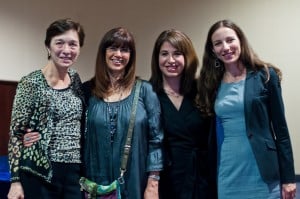 As a young child in Moldova, being Jewish meant two things to Zoya Shvartzman: her parents spoke a strange language at home, and she was pushed to be better than anyone else, particularly in school.
As a young child in Moldova, being Jewish meant two things to Zoya Shvartzman: her parents spoke a strange language at home, and she was pushed to be better than anyone else, particularly in school.
The language wasn’t identified as Yiddish, nor was the expectation of excellence attributed to the discrimination and anti-Semitism that prevailed in the small European country in the early 1980s.
It wasn’t until she was eight, and her mother insisted Shvartzman take part in a Jewish choir, that she learned more about Judaism.
“It was there that I ate my first matzo and lit my first Shabbat candle,” says Shvartzman. A few months later, the family made Aliyah to Israel.
Shvartzman, director of resource development in Europe for the American Jewish Joint Distribution Committee (JDC), told the story to members of the Women’s Cabinet of the United Jewish Federation of Tidewater during their spring luncheon.
The reason she shared her childhood experiences, she said, was to let the Tidewater community know that when they give to the UJFT’s Annual Campaign, they are helping people like her.
“When I was older, and I moved with my mother to Vancouver, we fell on hard times again,” she remembers. “The Jewish community helped us with food, but they didn’t only fill our stomachs. They also filled our souls.”
Three years ago, Shvartzman discovered the Jewish choir she took part in as a child wasn’t just any Jewish choir, it was a JDC funded program.
“You have no idea how much it meant to me to realize there are people out there who didn’t even know me, who cared not only about my physical self, but my spiritual self as well,” says Shvartzman. “You might not be aware of what your actions do for thousands of people around the world. I’m here to tell you that what you do makes a difference.”
Shvartzman was in Virginia Beach with her colleague Taly Shaul, JDC’s deputy director in Hungary and the general director of the Hungarian Jewish Social Support Foundation. While here, the women visited the Sandler Family Campus, Beth Sholom Village, and, most relevant to Shaul, the Jewish Family Service of Tidewater.
Shaul was involved in planning the Jaffe Jewish Family Service in Budapest, Hungary, which was modeled, in part, after the Tidewater JFS. She, and others, worked closely with local resident Karen Jaffe and members of the Jaffe family to open the center in 2007. The Jaffe JFS provides programming and support services to underprivileged children and families in Hungary. Two thousand Jewish children have been identified in need of services there.
“This is the first time I have seen a Jewish Family Service in this country and I am so impressed,” notes Shaul, who lives in Hungary but was originally from Israel. “The facilities are beautiful and the services offered are so important. We aren’t there yet in my country, but it gives us inspiration to see what one day we might be able to do in Hungary.”
The two women gave presentations to community members while here. They shared the history of Hungary and its Jewish population. The number of Jews living in the country has fluctuated between over a million prior to Holocaust, to somewhere around 100,000 today.
“It is difficult to get an accurate number because Jews still don’t want to put their names on any lists,” says Shaul. “That is how they were found during the Holocaust. There were lists of where people lived, and the Hungarians—who were responsible formost of the 540,000 Jews persecuted in one year—knew exactly where to find the Jews.”
Shaul noted that because of programs, many JDC-funded, younger Hungarians are beginning to identify themselves as Jews. She also noted Hungary has the second largest synagogue in Europe, a rabbinical seminary, a Jewish University, a Jewish hospital, and a Jewish camp that teens from throughout the Former Soviet Union and Europe attend.
“I must tell you though, that there is anti-Semitism in Hungary and it is getting worse,” Shaul says. “It is very frightening. They use all of the vocabulary from before the war and Jewish people are becoming afraid again.”
The mix of sobering and positive reports Shaul and Shvartzman gave to community members and agencies were met with welcome interest. Both women said they came
to Tidewater as strangers, but within hours felt like they were among family—a family they found to be warm and generous.
“From Israel, I needed to go to Hungary to find out that Jewish identity can not be taken for granted,” Shaul says. “I needed to come to America to find out how privileged you are and what it is like not to be discriminated against because of your religion.
“And I needed to come to Tidewater to seethe wonderful community and people who care and do, not only for people here, but for other communities and countries, too.”
The American Jewish Joint Distribution Committee (JDC), the Jaffe Jewish Family Service, Beth Sholom Village, and Jewish Family Service of Tidewater are all helped financially through generous gifts made to the United Jewish Federation of Tidewater’s Annual Campaign.
by Laine M. Rutherford
